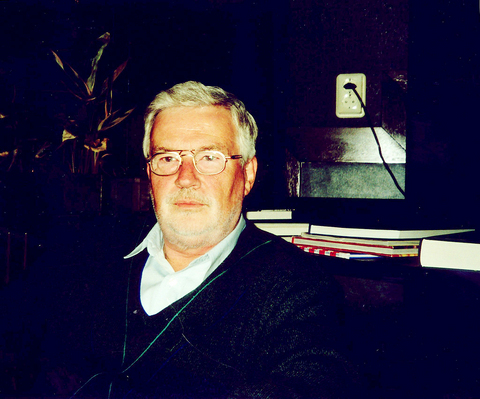In the first trial involving the mass killing of Iraqi Kurds with chemical weapons, a Dutch court on Friday sentenced a supplier of the weapon ingredients to 15 years in jail.
The judges convicted Frans van Anraat, 63, a Dutch businessman, of complicity in war crimes because they said he had known that the materials he sold to Iraq during the rule of former president Saddam Hussein could be used to make lethal poison gas.
The court acquitted him of complicity in genocide, because it said it could not be proved that he knew that the chemicals would be used for genocide. The raw materials were sent to Iraq before they were used in the mass attack against Kurdish villagers, the court said.

PHOTO: EPA
Van Anraat received the maximum sentence for complicity in war crimes. But the judges' decision said that "the crimes are of such a grave nature that even the maximum sentence cannot do them justice."
A group of Kurds, some of whom had joined the lawsuit as relatives of victims, applauded in court when the sentence was handed down, and several dozen others played music and danced outside the courthouse in The Hague afterward, witnesses said.
Lawyers involved in the monthlong trial said it was the first time a court had ruled that the attack by Saddam's troops on the town of Halabja in 1988 was genocide. The attack, which was part of a broader campaign against Iraqi Kurds, killed more than 5,000 people in a single day, while blinding and maiming many others.
The massacre also forms part of the charges brought against Saddam, who is now on trial in Baghdad in connection with a different large-scale killing.
Van Anraat's case is also the first in which a supplier of potentially harmful ingredients had been charged with genocide and convicted in connection with war crimes under a new mix of national and international law. In the past, the delivery of goods like the chemicals that van Anraat sold to Iraq despite export bans would probably have been dealt with as an economic crime, said Heikelina Verrijn-Stuart, a Dutch specialist in international law.
"This sends an important signal to suppliers and traders," she said.
"It says that they, too, can be prosecuted and held accountable for war crimes," she added.
The indictment of van Anraat said he had used a Panamanian company based in Switzerland to try to cover up his dealings with Iraq.
The indictment said the chemicals could be used as ingredients in mustard and nerve gases, which eventually were used against the Kurdish population in Iraq and during Iraq's war against Iran in the 1980s.
Prosecutors said van Anraat, acting as a middleman, had used schemes to ship the chemicals from Japanese producers via countries including Italy, Luxembourg, Switzerland and Singapore. He sent them under labels like "flame retardants."
During the trial, he admitted to selling the goods, but maintained that he thought they would be used in the textile industry. Several witnesses, including a Japanese business associate of van Anraat, testified that he knew of the materials' potentially lethal use.

ANGER: A video shared online showed residents in a neighborhood confronting the national security minister, attempting to drag her toward floodwaters Argentina’s port city of Bahia Blanca has been “destroyed” after being pummeled by a year’s worth of rain in a matter of hours, killing 13 and driving hundreds from their homes, authorities said on Saturday. Two young girls — reportedly aged four and one — were missing after possibly being swept away by floodwaters in the wake of Friday’s storm. The deluge left hospital rooms underwater, turned neighborhoods into islands and cut electricity to swaths of the city. Argentine Minister of National Security Patricia Bullrich said Bahia Blanca was “destroyed.” The death toll rose to 13 on Saturday, up from 10 on Friday, authorities

Local officials from Russia’s ruling party have caused controversy by presenting mothers of soldiers killed in Ukraine with gifts of meat grinders, an appliance widely used to describe Russia’s brutal tactics on the front line. The United Russia party in the northern Murmansk region posted photographs on social media showing officials smiling as they visited bereaved mothers with gifts of flowers and boxed meat grinders for International Women’s Day on Saturday, which is widely celebrated in Russia. The post included a message thanking the “dear moms” for their “strength of spirit and the love you put into bringing up your sons.” It

In front of a secluded temple in southwestern China, Duan Ruru skillfully executes a series of chops and strikes, practicing kung fu techniques she has spent a decade mastering. Chinese martial arts have long been considered a male-dominated sphere, but a cohort of Generation Z women like Duan is challenging that assumption and generating publicity for their particular school of kung fu. “Since I was little, I’ve had a love for martial arts... I thought that girls learning martial arts was super swaggy,” Duan, 23, said. The ancient Emei school where she trains in the mountains of China’s Sichuan Province

DISASTROUS VISIT: The talks in Saudi Arabia come after an altercation at the White House that led to the Ukrainian president leaving without signing a minerals deal Ukrainian President Volodymyr Zelenskiy was due to arrive in Saudi Arabia yesterday, a day ahead of crucial talks between Ukrainian and US officials on ending the war with Russia. Highly anticipated negotiations today on resolving the three-year conflict would see US and Ukrainian officials meet for the first time since Zelenskiy’s disastrous White House visit last month. Zelenskiy yesterday said that he would meet Saudi Arabian Crown Prince Mohammed bin Salman, the nation’s de facto leader, after which his team “will stay for a meeting on Tuesday with the American team.” At the talks in the Red Sea port city of Jeddah, US